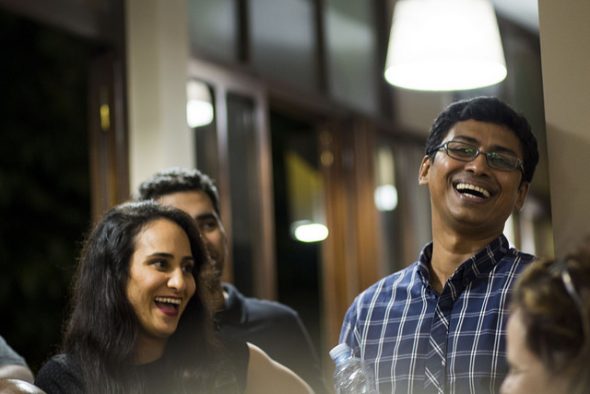
Accessed 17 Sept. 2017 from https://flic.kr/p/X7Fajd
With the rapid development of social media, it is easier for people to gather and share information with friends or even strangers. Further, most social media like Twitter or Facebook recommend new pages or articles to their users by using data analysis. However, there are also risks behind this seeming convenience: we may only see news or comments which are in agreement with our own opinions. If this creates a negative circulation, which means people from both sides start treating others with stereotypes, more and more conflicts or even terrifying events like the terrorist attacks may be brought to the stage. For instance, if the Western people start being unfriendly to Muslims due to the fear of terrorism, ISIS might make use of this opportunity to recruit young people. As a psychology major student, I would like to provide the perspective of Social Psychology on schemas and group dynamics when it comes to solving terrorism.
There is a hypothesis called “Cognitive miser” in a subfield, social cognition. It means people have limited cognitive resources. As a result, we tend to use schemas, which can be seen as a set of attitudes and presumptions toward a group or certain topic, to save our time and mental resources. Further, in groups, people who already held same assumptions gather together and exchange ideas. However, there isn’t any exchange happening. It just helps people strengthen their perspectives because they might think they already discuss their beliefs with others. Nevertheless, they don’t really interact with those people whom they imposed those negative impressions on. Thus, the decisions or viewpoints made by groups may be more extreme. This phenomenon is called “group polarization,” or “group extremity shift” (McCauley and Moskalenko).
After knowing the psychological tendency people have, I think one of the possible ways we can adopt to counter terrorism lies in recognizing and revising our presumptions toward others in daily lives. How can we achieve this goal? I think the easiest way to combat those assumptions is through interaction with different people, especially the ones you might assume dangerous before. You can also ask them questions you’ve held for a long time as long as you ask them politely and respectfully. In this way, we might get the chance to break the wall in our heart and even build a positive relationship with others afterward. For example, after discussing the international situation Taiwan is facing with one of my Chinese friends, he seemed to understand why lots of Taiwanese teenagers feel angry about China, mainly China’s government. For me, genuine interaction should be more than three minutes, exchanging each other’s ideas and without the disturbance of any mobile device. By genuine interaction, we might find that people from a particular culture, religion or social group are not as different as we assume. Then, instead of living in terror and fear, we may have a chance to find a way to communicate between various groups rather than enhance those negative assumptions.
In my opinion, terrorism festers due to misunderstanding and unexamined beliefs. Before we blame anyone for the lack of action or view it as a problem from the outside world for us to “solve,” I think we’d better reflect on long-held beliefs and avoid adopting them without actual interaction with anyone. In an Indian movie, My Name Is Khan, Khan faced racism after Sept 11, 2001, because he “looks like” a Muslim and has a Muslim name. Khan tried hard to say “My name is Khan and I am not a terrorist,” to the people in the United States and the President in public events. This plot touched my heart and let me hold a belief that we should not accuse anyone of unfavorable labels beforehand. Even though there may be a possibility to conquer terrorism in other ways, it will produce more hatred, and it’s not what I hope the world to be.
Reference
McCauley, Clark, and Sophia Moskalenko. “Mechanisms of Political Radicalization: Pathways Toward Terrorism.” Terrorism and Political Violence, vol. 20, no. 3, 3 July 2008, pp. 415-33, doi:10.1080/09546550802073367. Accessed 17 Sept. 2017.


I think this post is really interesting. I like how you point to specific psychological processes to help us understand internalized stereotypes better, and I also appreciate how you outline the concept of genuine interaction. Lots to think about!